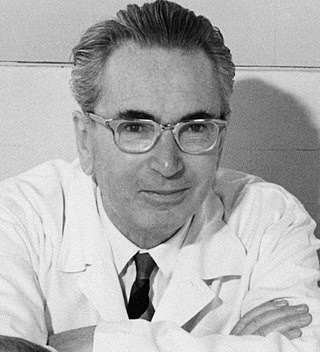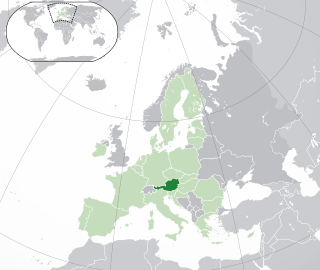The Austrian School is a heterodox school of economic thought that advocates strict adherence to methodological individualism, the concept that social phenomena result primarily from the motivations and actions of individuals and their self interest. Austrian school theorists hold that economic theory should be exclusively derived from basic principles of human action.

Austria-Hungary, often referred to as the Austro-Hungarian Empire or the Dual Monarchy, was a multi-national constitutional monarchy in Central Europe between 1867 and 1918. A military and diplomatic alliance, it consisted of two sovereign states with a single monarch who was titled both emperor of Austria and King of Hungary. Austria-Hungary constituted the last phase in the constitutional evolution of the Habsburg monarchy: it was formed with the Austro-Hungarian Compromise of 1867 in the aftermath of the Austro-Prussian War and was dissolved shortly after Hungary terminated the union with Austria on 31 October 1918.

Viennavee-EN-ə is the capital, most populous city, and one of nine federal states of Austria. It is Austria's primate city, with just over two million inhabitants. Its larger metropolitan area has a population of nearly 2.9 million, representing nearly one-third of the country's population. Vienna is the cultural, economic, and political center of the country, the fifth-largest city by population in the European Union, and the most-populous of the cities on the Danube river.

Klagenfurt am Wörthersee is the capital and largest city of the Austrian state of Carinthia, as well as of the historical region of Carinthia including Slovene Carinthia. With a population of 104.862, it is the sixth-largest city in Austria after Vienna, Graz, Linz, Salzburg, and Innsbruck. The city is the bishop's seat of the Roman Catholic Diocese of Gurk-Klagenfurt and home to the University of Klagenfurt, the Carinthian University of Applied Sciences and the Gustav Mahler Private University for Music. Klagenfurt is regarded the cultural centre of the Carinthian Slovenes, one of Austria's indigenous minorities.

Viktor Emil Frankl was an Austrian neurologist, psychologist, philosopher, and Holocaust survivor, who founded logotherapy, a school of psychotherapy that describes a search for a life's meaning as the central human motivational force. Logotherapy is part of existential and humanistic psychology theories.

The Austria national football team represents Austria in men's international football competitions, and is controlled by the Austrian Football Association.

Steyr is a statutory city, located in the Austrian federal state of Upper Austria. It is the administrative capital, though not part of Steyr-Land District. Steyr is Austria's 12th most populated town and the 3rd largest city in Upper Austria.

Austrian culture is characterised by historical and modern influences, including a history of interaction primarily between Celtic, Roman, Slavic and Germanic peoples. Austria is particularly known for its classical music, folk music, baroque architecture, coffee culture, winter sports and Alpine traditions.

The history of the Jews in Austria probably begins with the exodus of Jews from Judea under Roman occupation. There have been Jews in Austria since the 3rd century CE. Over the course of many centuries, the political status of the community rose and fell many times: during certain periods, the Jewish community prospered and enjoyed political equality, and during other periods it suffered pogroms, deportations to concentration camps and mass murder, and antisemitism. The Holocaust drastically reduced the Jewish community in Austria and only 8,140 Jews remained in Austria according to the 2001 census. Today, Austria has a Jewish population of 10,300 which extends to 33,000 if Law of Return is accounted for, meaning having at least one Jewish grandparent.

Ludwig Heinrich Edler von Mises was an Austrian–American Austrian School economist, historian, logician, and sociologist. Mises wrote and lectured extensively on the societal contributions of classical liberalism and the power of consumers. He is best known for his work on praxeology studies comparing communism and capitalism.
A list of the most notable films produced in the Cinema of Austria, ordered by year and split by decade of release.

Klaus Ebner is an Austrian writer, essayist, poet, and translator. Born and raised in Vienna, he began writing at an early age. He started submitting stories to magazines in the 1980s, and also published articles and books on software topics after 1989. Ebner's poetry is written in German and Catalan; he also translates French and Catalan literature into German. He is a member of several Austrian writers associations, including the Grazer Autorenversammlung.
Bostan (بوستان) is a town, 30 km by road (18.64 mi) from Quetta city in the Balochistan province of Pakistan.It is located at 30°25'57N 67°00'22E and has an altitude of 1593 metres. Bostan is Tehsil of the Pishin District. It was previously included in Tehsil Karezat and covers an area between Mount Takathu and the Red Hills.

Austria, formally the Republic of Austria, is a landlocked country in Central Europe, lying in the Eastern Alps. It is a federation of nine federal states, one of which is the capital, Vienna, the most populous city and federal state. Austria is bordered by Germany to the northwest, the Czech Republic to the north, Slovakia to the northeast, Hungary to the east, Slovenia and Italy to the south, and Switzerland and Liechtenstein to the west. The country occupies an area of 83,879 km2 (32,386 sq mi) and has a population of around 9 million.

The Vienna University of Economics and Business is a public research university in Vienna, Austria. The university received triple accreditation.

The Flame of Peace is an award granted by the Austrian non-profit organization Vereins zur Förderung des Friedens, which promotes world peace. Its symbol is a flame carving in wood and mounted on a stone base. The organization presents awards to prominent people, peace activists, and organizations in recognition of their activity in promoting peace.

The Austro-British Society (ABS) is a non-governmental organization that promotes the exchange between Austria and the United Kingdom. The Society was refounded in Vienna in 2009 by Kurt Tiroch and ever since supports the development of the bilateral relationship on cultural, economic and political topics.
The English Teacher Training College and its associated Bilingual Classroom Initiative (ABCi) was a not-for-profit Austrian college with campuses in Vorchdorf, Pressbaum and Wolfsberg registered with the Federal Ministry of the Interior. Founded by educators Frank Carle, Ben Stone and Jakob Gfrerer in 2011, the college worked in partnership with Austrian students, teachers and schools to promote English culture, language and sport in state schools, while providing subsidized teacher training courses for aspiring teachers.

Karl Nehammer is an Austrian politician who is the 32nd and current chancellor of Austria since 6 December 2021. A member of the Austrian People's Party (ÖVP), he previously was Minister of the Interior from 2020 to 2021, general secretary of the ÖVP from 2018 to 2020, as well as a member of the National Council from 2017 to 2020. Nehammer assumed the chancellorship as the successor of Alexander Schallenberg, who resigned to return as Minister of Foreign Affairs.














